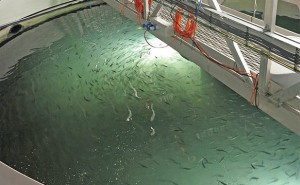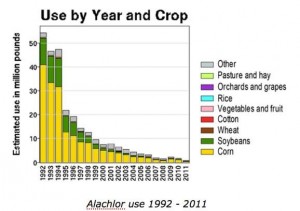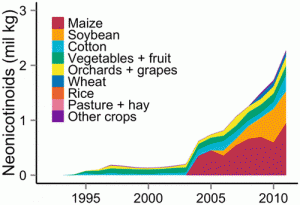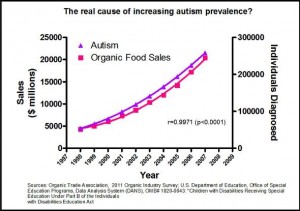Nov
30
2015

The FDA just approved the first GMO animal for human consumption – AquAdvantage Salmon. Those ideologically opposed to GMOs have predictably opposed this approval, and now are calling for labeling. Meanwhile some food outlets, like Costco, Trader Joe’s, Whole Foods, Safeway and Korger, have pledged not to sell the fish.
This is a great example of how ideological thinking leads to irrational and self-contradictory positions. Other than the fact that they were produced using genetic modification technology, these salmon are a wet dream (pun intended) of sustainable and environmentally friendly food production. ]
AquAdvantage Salmon
Salmon evolved a growth pattern that fits their seasonal migrations and their overall life cycle. There are several species of salmon, some Atlantic, some Pacific, and some exclusively fresh water. Atlantic salmon are the most common in fish farms.
Continue Reading »
Aug
25
2015
 A recent commentary published in the New England Journal of Medicine (NEJM) by Philip J. Landrigan and Charles Benbrook has sparked some controversy. Landrigan and Benbrook are publishing in a medical journal because they claim the issue of genetically modified organisms (GMOs) is a public health issue. They use extremely strained logic and misrepresentation to make their point, however.
A recent commentary published in the New England Journal of Medicine (NEJM) by Philip J. Landrigan and Charles Benbrook has sparked some controversy. Landrigan and Benbrook are publishing in a medical journal because they claim the issue of genetically modified organisms (GMOs) is a public health issue. They use extremely strained logic and misrepresentation to make their point, however.
Equating GMOs with Herbicides.
The primary logical flaw in their argument is their attempt to equate GMOs with the use of herbicides. They write:
Herbicide resistance is the main characteristic that the biotechnology industry has chosen to introduce into plants.
and
The first of the two developments that raise fresh concerns about the safety of GM crops is a 2014 decision by the Environmental Protection Agency (EPA) to approve Enlist Duo, a new combination herbicide comprising glyphosate plus 2,4-D. Enlist Duo was formulated to combat herbicide resistance.
The authors also acknowledge that:
” genetically engineered crops can increase yields, thrive when irrigated with salty water, or produce fruits and vegetables resistant to mold and rot.”
Continue Reading »
Jul
31
2015
 Dedicated anti-science groups engage in a number of methods to maintain their propaganda upstream against the scientific evidence. It’s actually not difficult- people are generally very good at motivated reasoning. We can demonize or lionize anything.
Dedicated anti-science groups engage in a number of methods to maintain their propaganda upstream against the scientific evidence. It’s actually not difficult- people are generally very good at motivated reasoning. We can demonize or lionize anything.
Methods include dismissing scientific studies whose conclusions you don’t like, supporting low quality studies you do like, misinterpreting and distorting other studies, and of course cherry picking. Sometimes, however, dedicated activists seem to literally make up studies out of whole cloth, or ideological scientists perform dubious studies to create fodder for their side.
This week on the SGU we interview Kevin Folta (the show will be published tomorrow) about some of his experiences with anti-GMO activists who have no problem making up the science to advance their ideological agenda. The more I look into anti-GMO activism the more I realize that the anti-vaccine movement has nothing on them when it comes to pseudoscience. Their methods are identical. The only real difference is that anti-GMO propaganda is much more mainstream.
Continue Reading »
Jun
02
2015
 PBS has put up an interactive resource on the GMO (genetically modified organisms) debate. You vote for which side you are on, and then the site feeds you arguments against your position. I like this idea, as it is always helpful to challenge yourself by confronting differing opinions. This is a sort of antiechochamber approach.
PBS has put up an interactive resource on the GMO (genetically modified organisms) debate. You vote for which side you are on, and then the site feeds you arguments against your position. I like this idea, as it is always helpful to challenge yourself by confronting differing opinions. This is a sort of antiechochamber approach.
Since I accept the strong scientific consensus that GMOs are generally safe (each genetic modification needs to be evaluated on its own, but so far existing GMOs have been found safe, and there are no established specific issues with the technology itself), and are a potentially useful technology, I took the pro side, which means PBS fed me all their anti-GMO arguments. I was struck by how consistently terrible their anti-GMO arguments were. It seems that PBS was trying to be fair and thorough, which implies that there are only terrible anti-GMO arguments, so they had no choice.
I am still honestly trying to find a non-terrible anti-GMO argument, because I agree with seeking out the best arguments on all sides of an issue, and being charitable to those arguments. PBS did not fulfill my quest. To be fair to PBS, they are reflecting the talking points of GMO critics, and that is what they say. They are not endorsing these positions. Here are their anti-GMO points:
Continue Reading »
Apr
30
2015
 A new propaganda point has entered the anti-GMO repertoire – that GMOs are killing the honey bees. This claim, like many of their claims, is highly misleading, as the actual cause is incidental to the technology of genetic modification or even its use. This hasn’t stopped headlines like this one from organicconsumers.org: GMOs Are Killing the Bees, Butterflies, Birds and . . . ?
A new propaganda point has entered the anti-GMO repertoire – that GMOs are killing the honey bees. This claim, like many of their claims, is highly misleading, as the actual cause is incidental to the technology of genetic modification or even its use. This hasn’t stopped headlines like this one from organicconsumers.org: GMOs Are Killing the Bees, Butterflies, Birds and . . . ?
This story follows a common strategy among the intellectually dishonest anti-GMO propaganda machine. The fact is, producing enough food to feed over 7 billion people (and growing) is not easy, and requires intensive high-yield farming. Farming, not surprisingly, is having an impact on the ecosystem. Just cutting down forests to make room for crops can have a huge effect, in addition to displacing native species. Perhaps the most challenging aspect of farming’s effect on the environment is that anytime you want to grow millions or even billions of something, critters will evolve to exploit that food source. Any attempt you make to fight back against those critters will inevitably result in resistance.
We face the same challenge with antibiotics. Crowding into cities, and the growing population of humans meant that bacteria who use humans for their lifecycle exploded, leading to outbreaks and epidemics of infectious diseases. Antibiotics have been a powerful weapon against bacterial infections, but evolution is relentless and has led increasingly to antibiotic resistance among bacteria pathogenic to humans and our livestock. This is a genuine dilemma, as we struggle to come up with new antibiotics, and enforce practices that reduce the emergence of resistance.
Continue Reading »
Feb
24
2015
There is so much anti-science propaganda out there I often feel like I am emptying the ocean with a spoon. Just today I was faced with an array of choices for my post – should I take on anti-vaccine, anti-GMO, or anti-AGW propaganda? For today, anyway, anti-GMO won. I’ll get to the others eventually.
This was sent to me by a reader – 5 reasons to avoid GMOs. The content is mostly tired anti-GMO tropes (lies, really) that have been thoroughly debunked, but it is good to address such propaganda in a concise way. Also, it is a useful demonstration of the intellectual dishonesty of the anti-GMO movement. I may not get through all of them today – each one is so densely packed with wrong, and it takes longer to correct a misconception than to create one. Here is point #1 – GMOs are not healthy:
GMOs are unhealthy: Since the introduction of GMOs in the mid-1990s, the number of food allergies has sky-rocketed, and health issues such as autism, digestive problems and reproductive disorders are on the rise. Animal testing with GMOs has resulted in cases of organ failure, digestive disorders, infertility and accelerated aging. Despite an announcement in 2012 by the American Medical Association stating they saw no reason for labeling genetically modified foods, the American Academy of Environmental Medicine has urged doctors to prescribe non-GMO diets for their patients.
The author begins with an assumption of causation from correlation. The increase in food allergies actually does not correlate well with the introduction of GMOs. The correlation between organic food and autism is much more impressive. In fact, the organic food industry has been rising steadily over this same time period, and so one could make the even stronger point that organic food causes all the listed ills.
Continue Reading »
Jan
15
2015
 The first generation of genetically modified organisms (GMOs) to hit the market mainly possessed agronomic traits, such as insect resistance and herbicide tolerance. These traits mainly benefit farmers, and when consumers accept such produce they expect them to be cheaper because of the increased efficiency.
The first generation of genetically modified organisms (GMOs) to hit the market mainly possessed agronomic traits, such as insect resistance and herbicide tolerance. These traits mainly benefit farmers, and when consumers accept such produce they expect them to be cheaper because of the increased efficiency.
There is a second generation of GMOs waiting in the wings, however, that have biofortified traits that can directly benefit the consumer. A recent article in Nature Biotechnology reviews these GMOs and marketing research about their acceptability.
There are six GMO staple crops ready for the market but awaiting regulatory approval. These include golden rice fortified with vitamin A, which has been held up in regulation for 15 years. Other products include rice fortified with folate, and multi-fortified crops such as corn fortified with vitamin A, folate, and vitamin C.
It is also possible to increase mineral content, such as iron, zinc, and copper. This can be done by increasing uptake by the roots, transport to edible tissues, or bioavailability (ability to be absorbed once eaten).
Continue Reading »
Oct
27
2014
After reading about genetically modified organisms for years, it seem pretty clear to me that the anti-GMO activist position is not an objective science-based position. Rather it has all the features of a political/marketing campaign. The campaign has talking points that are all spin and propaganda. Like a slick car commercial, it is selling a vibe, a worldview and a certain self-image.
Also like many political and commercial campaigns it is based on fear. Fear is a great motivator and politicians know the value of making the voters afraid of what will happen if their opponent is elected. Advertising agencies understand that you can sell a product by making it a solution to an imaginary fear. “Better safe than sorry” sells a lot of widgets.
The anti-GMO community seems closely tied to the organic food industry, which essentially sells the naturalistic fallacy on the back of irrational fears about everything artificial, whether or not there is any science behind those fears. Both, in turn, are tied to the alternative medicine community, which overlaps considerably in its fetish with all things natural, its demonizing of anything technological, and its apparent disdain for science (see Whole Foods as a good example of this overlap).
Continue Reading »
Sep
30
2014
 It is no longer news that Dr. Oz has long ago abandoned any pretense to scientific rigor and is simply another scaremongering hawker of snake oil and nonsense. Still, it’s hard not to marvel when he sinks to a new low.
It is no longer news that Dr. Oz has long ago abandoned any pretense to scientific rigor and is simply another scaremongering hawker of snake oil and nonsense. Still, it’s hard not to marvel when he sinks to a new low.
On a recent show Oz’s target was genetically modified organisms (GMO). This is not new for Oz, he has hosted anti-GMO activists in the past, warning his audience about non-existent health risks.
This time around Oz and his guest are claiming that pesticides used with certain GMO varieties may cause autism. Why is it always autism? It’s likely at least partly due to the fact that awareness of autism has been increasing in the last 2 decades, creating the false impression that autism itself is increasing. This leads to numerous false correlations (most famously with vaccines) and the assumption of cause and effect (often to support a preexisting bias). As you can see from the graph, however, the rise in autism diagnoses tightly correlates with increased organic food sales – but I guess you have to cherry pick the correlation you want.
The narrative that Oz spun for his audience was this: GMO is tied to pesticide use. Those pesticides are hazardous to your health, and specifically might cause autism. Organic food is pesticide free, and going organic can actually cure autism.
Every link in that chain of argument is misleading or patently wrong.
Continue Reading »
Sep
22
2014
 A recent New Yorker article by Michael Specter does an excellent job of putting the activism of anti-GMO campaigner, Vandana Shiva, into perspective. Shiva has since written a very critical response to Specter, and The New Yorker has responded to Shiva. The exchange is very enlightening.
A recent New Yorker article by Michael Specter does an excellent job of putting the activism of anti-GMO campaigner, Vandana Shiva, into perspective. Shiva has since written a very critical response to Specter, and The New Yorker has responded to Shiva. The exchange is very enlightening.
Shiva is a dedicated anti-GMO activist, perhaps the most widely known and successful in the world. Specter paints a picture of Shiva as more than an ideologue – a “demagogue” who has created a dramatic narrative that is meant to frighten the public about GMOs, but has little to do with reality. For Shiva, her anti-GMO stance is part of a broader economic and social ideology. In her vision of the world, local farmers would feed the world with organic farming, without fertilizer or corporate involvement. The actual science about GMOs seems to be irrelevant to her narrative.
Specter illustrates several example. There are definitely religious undertones to her activism. For example, Specter quotes her from a speech earlier this year:
“G.M.O. stands for ‘God, Move Over,’ we are the creators now,”
Continue Reading »














